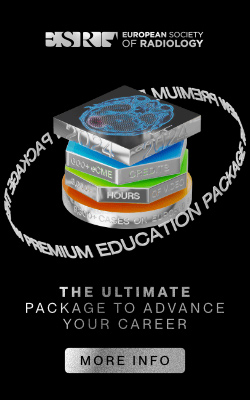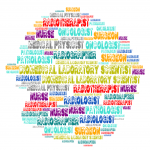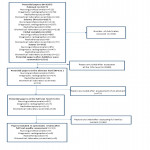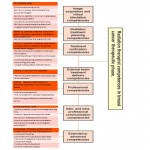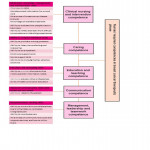Purpose
European Society of Breast Cancer Specialists (EUSOMA) recommends that healthcare organisations should pay serious attention to multidisciplinarity and patient-centred breast cancer pathways, beginning from the diagnostic stage to the therapeutic stage to the follow up stage [1,2]. Working multiprofessionally results in better breast cancer treatment, especially in terms of clinical and process outcomes such as patient participation in decision-making as well as cancer research [3].
Breast cancer care pathways comprise several professionals and it is not possible to consider them all in one study. (Figure...
Methods and materials
An integrative review of four databases was performed by an interprofessional research group. The following electronic databases were used: PubMed, Cinahl via EBsco Host search engine, ScienceDirect and Scopus. The searches for the different professional groups were made separately in October 2020. Keywords used in the searches by professional group were: nurse, breast cancer, competence, competency, skills or knowledge, biomedical laboratory scientist, biomedical technologist, medical laboratory scientist, medical laboratory technologist, clinical laboratory scientist, histotechnologist, competence, competency, skills or knowledge, radiotherapist, radiation therapist, therapy radiographer, therapeutic...
Results
Five studies were quantitative quasi-experimental or cross sectional survey studies. Seven studies were at least partly qualitative, applying various types of qualitative methodologies. One stydy applied a mixed methods design. Seven main competencies needed in breast cancer therapeutic stage were found for radiation therapists: image acguisition and virtual simulation competences, radiation treatment planning competencies, treatment verification competencies, external beam treatment delivery, professional competencies, inter and intra professional communication competencies and extended or advanced competencies. Each of these consisted of from two to six subcompetencies. (Figure...
Conclusion
There are clearly identifiable competence areas by current studies for radiation therapists and nurses in breast cancer therapeutic phase. However, there are professional groups like biomedical laboratory scientists, nuclear medicine technologists and diagnostic radiographers that participate in breast cancer care and therapy, but the competences required are still unrecognized and undefined. However, recognizing these professionals and their competencies as a part of the breast cancer therapeutic pathway is important, in particular for the sake of continuity and seamlessness of care as well as for patient...
Personal information and conflict of interest
E. M. Metsälä:
Nothing to disclose
K. Paalimäki-Paakki:
Nothing to disclose
J. Hoffren:
Nothing to disclose
J. A. Jorge:
Nothing to disclose
S. Kivistik:
Nothing to disclose
R. Lumme:
Nothing to disclose
L. Marmy:
Nothing to disclose
T. S. Schroderus-Salo:
Nothing to disclose
B. Strom:
Nothing to disclose
References
Eusoma. The requirements of a specialist breast unit. European Journal of Cancer. 2000;36(18):2288-2293. doi:10.1016/S0959-8049(00)00180-5
Biganzoli L, Cardoso F, Beishon M, et al. The requirements of a specialist breast centre. The Breast. 2020;51:65-84. doi:10.1016/j.breast.2020.02.003
Harbeck N, Gnant M. Breast cancer. The Lancet. 2017 18;389(10074):1134-1150. doi: 10.1016/S0140-6736(16)31891-8.
Strobe Group. 2007. STROBE Statement—checklist of items that should be included in reports of observational studies. Accessed May 6, 2021. https://www.strobe-statement.org/index.php?id=strobe-aims
Acharya U, Cox J, Rinks M, Gaur P, Back M. Ability of radiation therapists to assess radiation-induced skin toxicity....
